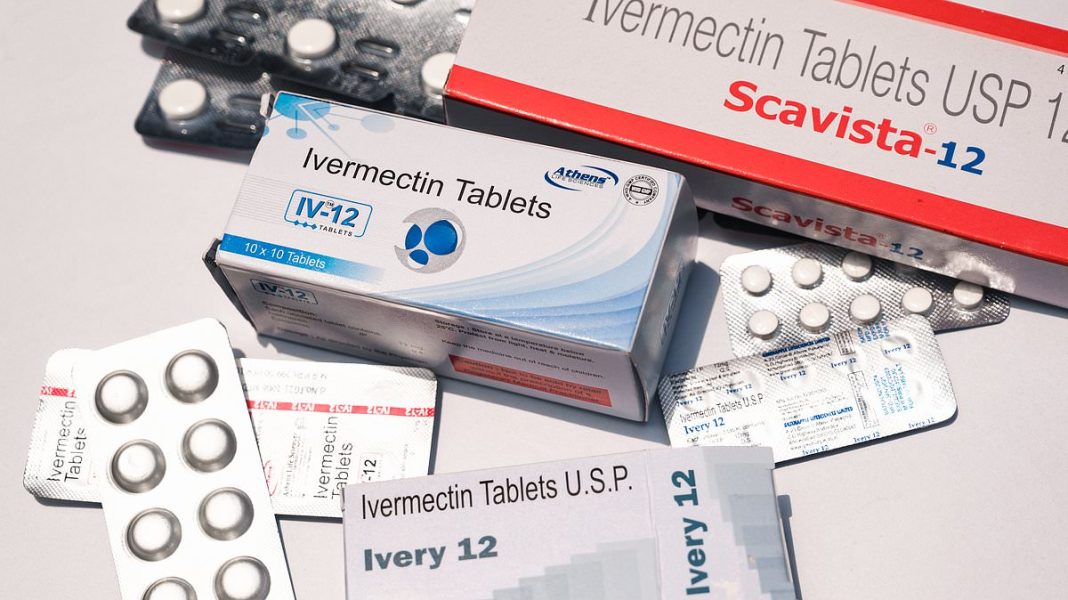Ever the award-winning actor, Mel Gibson eases into drama mode when the conversation turns to sickness.
‘I’ll tell you a good story,’ the Hollywood star announces in an interview on the The Joe Rogan Experience podcast. ‘I have three friends. All three of them had stage 4 cancer. All three of them don’t have cancer right now at all.’
A good story, indeed. But it becomes a little more eyebrow-raising when host Rogan – who has previously sparked controversy for his anti-establishment and anti-vaccine views – asks how.
Smiling knowingly, 69-year-old Gibson lists a series of alternative ‘treatments’ they tried – including drinking ‘hydrochloride something or other’.
Yet his biggest endorsement, if the rate of enthusiastic head-nodding can be used as a yardstick, comes with the mention of ivermectin: a de-worming treatment originally developed for horses.
‘This stuff works, man,’ is Gibson’s less-than-expert conclusion.
With the episode attracting more than 11 million YouTube views since it was released in January, it is hardly surprising that it’s sparked something of a moment for ivermectin.
So much so that senior cancer doctors last week warned that interest in the drug and exaggerated claims about its capabilities are ‘spreading like wildfire’. Other experts have emphasised that there is currently no evidence it can shrink cancer in humans.
Gibson’s is not the first dubious claim to be made about ivermectin – which has been hailed as a ‘wonder drug’ capable of curing Covid by MAGA acolytes including US Health Secretary Robert F Kennedy Jr.
But why has this anti-parasitic treatment taken such a hold of the public’s imagination? And how exaggerated are its ‘wonder drug’ credentials?
Ivermectin was originally introduced as a veterinary drug in the late 1970s to de-worm horses and other livestock animals. By the end of the Eighties, it had been approved for use in humans to treat conditions such as head lice and scabies.
No one has ever seriously questioned its credentials as a drug to treat parasitic infections. Scientists William Campbell and Satoshi Omura were awarded the 2015 Nobel Prize in Physiology or Medicine for discovering Avermectin, a drug that led to the development of ivermectin – which is now included on the World Health Organisation’s List of Essential Medicines.
But things took a bizarre twist on April 23, 2020 – six weeks after the WHO declared the coronavirus outbreak as a global pandemic – when Donald Trump made a rather strange statement.
In a White House briefing, Mr Trump, then entering the final months of his first US presidency, suggested that injecting bleach into the human body might be one way of tackling the virus. Within hours, at least five states reported a surge in calls to poison centres after individuals put the advice to the test.
It marked the beginning of a wave of so-called coronavirus ‘cures’ that turned out to be completely ineffective.
Other unproven therapies that had moments in the spotlight included anti-malaria medicines hydroxychloroquine and chloroquine, which was blamed for the death of a man in Arizona that year.
Yet it was the popularity of ivermectin, which started to attract attention in Latin America towards the end of 2020, that seemed to endure.
Very early research suggested that the drug may have had some effect against the type of molecules associated with Covid. But even if it could have stamped out the virus, the doses required would have been far higher than what could be safely given to humans. As such, experts concluded that it offered no hope in the fight against the virus.
By that stage, however, the drug had already been seized upon by elements of the burgeoning anti-vaccination lobby in America. Conservative radio presenter Phil Valentine wrote on Facebook a month before he died of Covid-related complications in 2021: ‘Have a doctor on speed dial who will write you a prescription for ivermectin.’
Other prominent commentators, including Rogan and former Fox News presenter Tucker Carlson, were also name-checking the drug on a regular basis.
Elsewhere, the use of ivermectin as a Covid cure was gaining traction on the internet and across social media. Scores of Facebook groups and Reddit communities sprung up to swap dosage directions and purchasing advice.
As the Covid crisis progressed, data showed that prescriptions for the drug were running at more than nine times pre-pandemic levels. Bosses at the US Food and Drug Administration (FDA) agency even issued a blunt warning to the public: ‘You are not a horse. You are not a cow. Seriously, y’all. Stop it.’
But, even as the threat from Covid receded, ivermectin never really went away. One recent contribution to the debate came from Pierre Kory, a New York medic who told a US Senate hearing in December 2020 that it was a ‘wonder drug’ when it came to coronavirus.
As suggested by the title of his book, The War On Ivermectin: The Medicine That Saved Millions And Could Have Ended The Pandemic, Dr Kory still stands by his claim about the drug’s ‘miraculous effectiveness’ against the virus.
He also insists that the medical establishment’s response to the pandemic was marked by ‘widespread fraud, corruption and propaganda’.
Yet, despite being widely discredited and stripped of his certification by the American Board of Internal Medicine last year, Dr Kory is not without his supporters. Among those to give their backing has been RFK Jr, describing him as ‘one of the heroic figures of our time’ and ‘a courageous physician who sacrificed career, reputation, friendships, status and livelihood for the health of his patients and humanity’.
Of course, RFK Jr is a controversial figure in his own right. The 71-year-old, a former chairman of the Children’s Health Defense anti-vaccine lobby group, has spent years promoting debunked claims about a wide variety of scientifically-proven jabs. Two weeks ago he sacked all 17 members of a federal vaccine advisory committee on the grounds that ‘a clean sweep is needed to re-establish public confidence in vaccine science’.
Reports earlier this year indicated that RFK Jr lobbied the FDA in May 2021 – when he was not serving as a politician or public official – to block new Covid vaccines because other treatments including ivermectin were already available.
Now, with Mel Gibson’s remarks, it is perhaps unsurprising that ivermectin is under the spotlight again – this time as a possible cancer cure.
But the experts are baffled by the response. ‘[Ivermectin’s popularity] has spread like wildfire, in the sense that a lot of patients are intrigued to hear about new options,’ Tennessee-based cancer specialist Samyukta Mullangi told the Oncology News Central website last week.
‘But it is not clear to me why anti-parasitic drugs have gained such attention as alternative forms of treatment.’
Preliminary trials have shown ‘a potential effectiveness’ in treating cancer in mice, according to radiation oncology expert Dr Skyler B. Johnson from the University of Utah. But he stressed that ‘the doses used in mice would likely be toxic to be effective in humans’.
He added: ‘There is currently no evidence in humans, or in patients with actual cancer, that these drugs are effective at decreasing cancer growth.’
Meanwhile, delegates at the American Society of Clinical Oncology’s annual meeting in Chicago earlier this month were told of a study involving eight breast cancer patients who were treated with ivermectin as well as immunotherapy.
While one patient had a partially positive response, Dr Johnson insisted that this ‘was the exact number you would [expect] if patients were getting immunotherapy by itself’.
The evidence remains far-fetched, then, to say the least. But as the views continue ticking up on Mel Gibson’s interview, doctors may struggle to contain the spread of this so-called wonder drug’s following.







